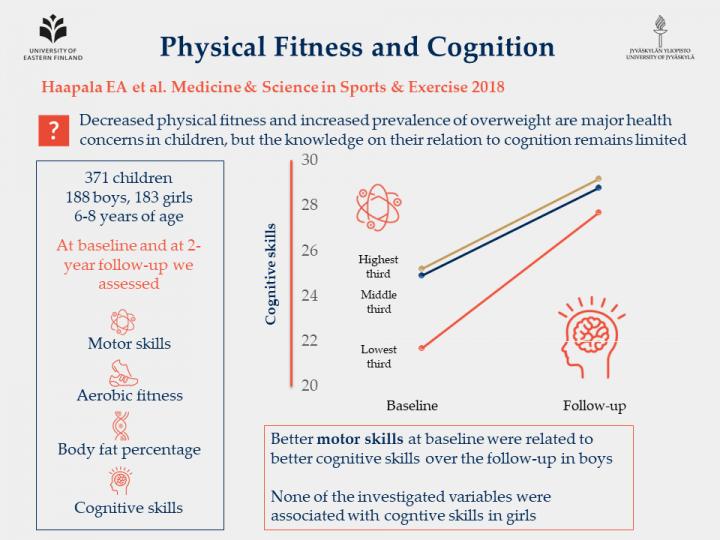
Credit: Eero Haapala
Boys with good motor skills are better problem-solvers than their less skilful peers, a new study from Finland shows. In contrast to previous studies, the researchers found no association between aerobic fitness or overweight and obesity with cognitive function in boys. The results are based on the Physical Activity and Nutrition in Children (PANIC) Study conducted at the University of Eastern Finland, and they were published in Medicine & Science in Sports & Exercise.
The study found that boys with better motor skills at baseline had higher cognitive scores over a two-year follow-up period than boys who had poorer motor skills. In contrast to previous cross-sectional studies, the present study shows that children with different levels of aerobic fitness or body fat percentage did not differ in cognition. In fact, boys with higher aerobic fitness at the baseline of the study had poorer cognition during the two-year follow-up than those with lower fitness.
In girls, none of the above-mentioned factors was associated with cognitive skills. This may be due to biological or sociocultural differences between boys and girls.
The results also show that boys with better motor skills at baseline had a smaller increase in their cognitive skills than those with poorer motor skills.
“It is important to remember that these results do not necessarily reflect a causal relation between motor skills and cognition. Boys with poorer motor and cognitive skills at baseline caught up with their more skilful peers during the two-year follow-up,” says Postdoctoral Researcher Eero Haapala from the University of Jyväskylä. Dr Haapala is also Adjunct Professor of Paediatric Exercise Physiology at the University of Eastern Finland.
The results suggest that motor skills and cognition are associated with one another in boys; however, it would be premature to claim that motor skills boost cognition. Furthermore, the study found no association between aerobic fitness or overweight and obesity with cognition.
The study investigated the longitudinal associations of motor skills, aerobic fitness, and body fat percentage with cognition in 371 children who were 6-8-years old at baseline. Motor skills were evaluated by agility, balance and manual dexterity tests, aerobic fitness by a maximal cycle ergometer test, and body fat percentage by a DXA-device. Cognition was assessed by the Raven’s Matrices Test. Several confounding factors such as parental education and annual household income were controlled for in the analyses.
###
For further information, please contact:
Postdoctoral Researcher, Adjunct Professor Eero Haapala, tel. +358408054210, [email protected], Twitter: @EeroHaapala
Research article:
Haapala EA, Lintu N, Väistö J, Tompuri T, Soininen S, Viitasalo A, Eloranta AM, Venäläinen T, Sääkslahti A, Laitinen T, Lakka TA. Longitudinal Associations of Fitness, Motor Competence, and Adiposity with Cognition. Medicine & Science in Sports & Exercise 2018. 10.1249/MSS.0000000000001826
https://journals.lww.com/acsm-msse/Abstract/publishahead/Longitudinal_Associations_of_Fitness,_Motor.96771.aspx
The results explained
GrowKudos explanation: https:/
Media Contact
Eero Haapala
[email protected]
358-408-054-210
Related Journal Article
http://dx.




